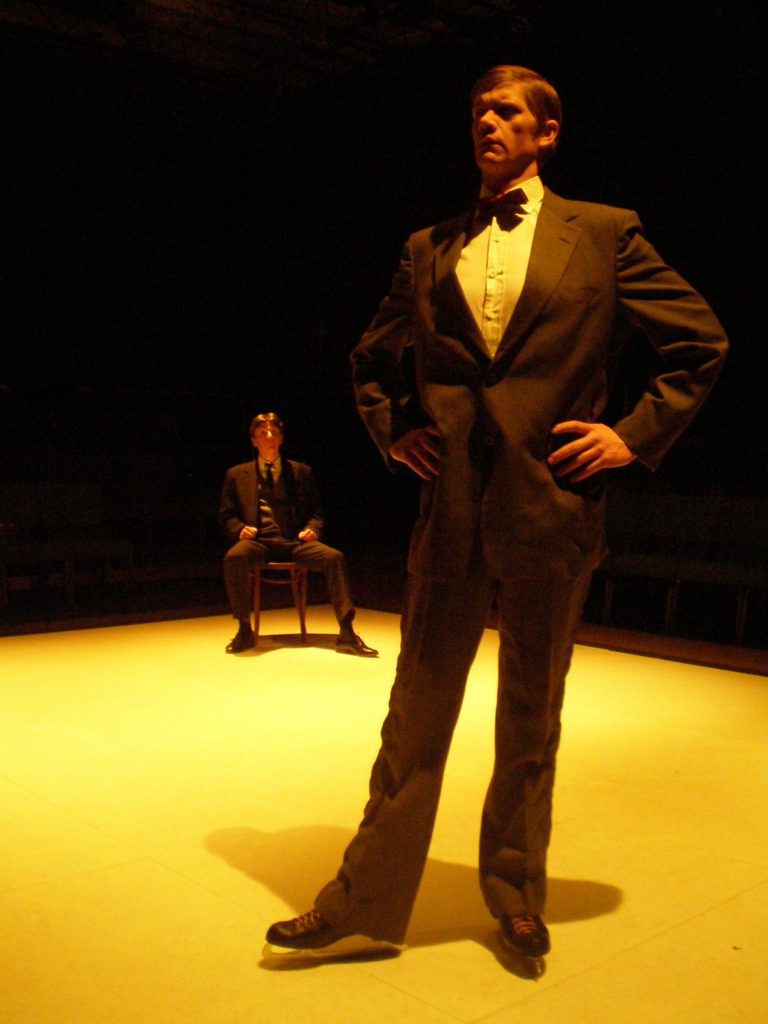How perfect that Buntport is reviving Kafka on Ice – first produced in 2004, and one of my favorite of the company’s many inventive works – as part of a citywide celebration of all things Czech. First, because Franz Kafka is the Czech author best known in this country, with legions of schoolkids guided every year through his novella, The Metamorphosis, in which the protagonist, Gregor Samsa, wakes up one morning to find himself transformed into a giant beetle. And second, because the Buntporters’ sensibility, humor, use of objects and puppets, bare-bones tech and ways of playing with physical size and perception are so very Czech. When, for instance, Kafka sends one of his stories to a woman he loves, in her hands it unfolds into the paper figure of a man, with which she then dances. “The work does well with her,” he observes. The beetle itself takes many forms in this show, from an elongated shadow to an actor in a big, huggy felt costume. In one frenetic scene, it morphs from a hand puppet into a plastic remote-controlled toy that skitters frantically around the stage.
There’s a brilliant mix of genres and parodies on show as well, from a flirty, meet-cute, silent-movie-style ice-skating scene (oh, yes, everyone except Kafka himself skates through this) to a high-stepping parody of the Yiddish theater the author attended with a friend.
The script of Kafka on Ice is unchanged from the first iteration, and yet the show felt different this time around – still intensely funny, yet sadder, too. Critics talk about how the plight of poor Gregor – trapped and isolated in his ugly carapace, terrified of his father and reliant on the intermittent kindness of his sister, slowly sickening until, to the relief of his family, he quietly expires – reflects Kafka’s despairing view of his own existence. Buntport intertwines this plot with pieces of Kafka’s other writings and events from his life, and while I remember some glimmers of transcendence last time, they now seem to have vanished. Perhaps in part because Josh Hartwell has taken over the role of Kafka from Gary Culig and makes him more baffled, gentle and unhappy; perhaps because the entire ensemble – all the other performers are the same – has matured and changed in indefinable ways.
But with this production, I was more aware of a parallel theme, one that carried a fragment of hope. An author’s work is never really his own, nor is his life. Kafka on Ice explores the transformations and permutations Kafka’s work and reputation went through in the years following his death – including this production itself. In one hilarious scene, Erin Rollman plays a somewhat dim teacher trying to explain symbolism with the aid of a soulless educational cheat sheet. In another, lepidopterist and major literary figure Vladimir Nabokov (Erik Edborg) gives his scholarly opinion on just what kind of creature Gregor Samsa transformed into. But there’s also a quietly powerful interlude in which a voice in the dark simply reads the beginning of the story. The lights come up, and we see a schoolboy walking slowly across the stage, book in hand. Every now and then Kafka/Gregor’s existential loneliness gets broken – by a sudden embrace from the charlady, for example, outrageously played by Evan Weissman in a maid’s outfit. (I took this as a manifestation of Weissman’s essential kindliness, since the charlady in the actual book is a pretty rough character.)
Before he died, Kafka asked his close friend and literary executor Max Brod to destroy all of his work. Brod didn’t – an obvious betrayal. But what I’d missed before and definitely noticed this time around was a certain depth to Brian Colonna’s Brod, and words that justified an action that not only preserved Kafka’s priceless literary legacy, but in some sense rescued his soul.
-Juliet Wittman, February 2, 2011, Westword
